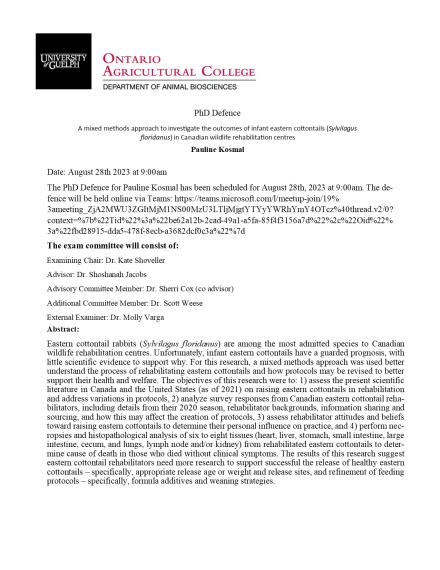Teams: https://teams.microsoft.com/l/meetup-join/19%3ameeting_ZjA2MWU3ZGItMjM1NS00MzU3LTljMjgtYTYyYWRhYmY4OTcz%40thread.v2/0?context=%7b%22Tid%22%3a%22be62a12b-2cad-49a1-a5fa-85f4f3156a7d%22%2c%22Oid%22%3a%22fbd28915-dda5-478f-8ecb-a3682dcf0c3a%22%7d

A mixed methods approach to investigate the outcomes of infant eastern cottontails (Sylvilagus floridanus) in Canadian wildlife rehabilitation centres
Eastern cottontail rabbits (Sylvilagus floridanus) are among the most admitted species to Canadian wildlife rehabilitation centres. Unfortunately, infant eastern cottontails have a guarded prognosis, with little scientific evidence to support why. For this research, a mixed methods approach was used better understand the process of rehabilitating eastern cottontails and how protocols may be revised to better support their health and welfare. The objectives of this research were to: 1) assess the present scientific literature in Canada and the United States (as of 2021) on raising eastern cottontails in rehabilitation and address variations in protocols, 2) analyze survey responses from Canadian eastern cottontail reha-bilitators, including details from their 2020 season, rehabilitator backgrounds, information sharing and sourcing, and how this may affect the creation of protocols, 3) assess rehabilitator attitudes and beliefs toward raising eastern cottontails to determine their personal influence on practice, and 4) perform nec-ropsies and histopathological analysis of six to eight tissues (heart, liver, stomach, small intestine, large intestine, cecum, and lungs, lymph node and/or kidney) from rehabilitated eastern cottontails to deter-mine cause of death in those who died without clinical symptoms. The results of this research suggest eastern cottontail rehabilitators need more research to support successful the release of healthy eastern cottontails – specifically, appropriate release age or weight and release sites, and refinement of feeding protocols – specifically, formula additives and weaning strategies.

